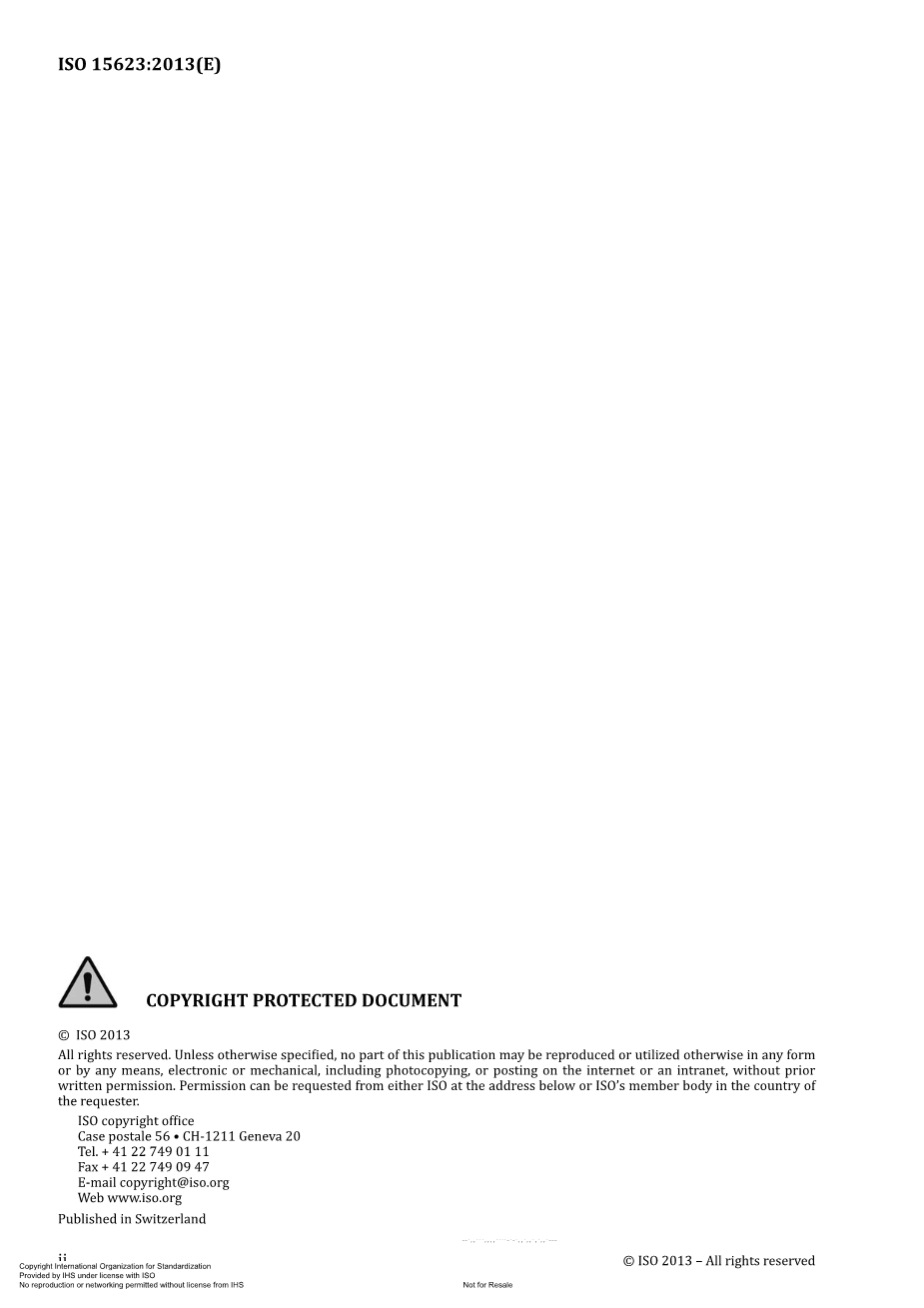

英语原文共 38 页,剩余内容已隐藏,支付完成后下载完整资料
原文
INTERNATIONAL
STANDARD
ISO
15623
Second edition
2013-07-15
Reference number
ISO 15623:2013(E)
Copyright International
Intelligent transport systems —Forward vehicle collision warning systems — Performance requirementsand test procedures
Systegrave;mes intelligents de transport — Systegrave;mes drsquo;avertissement
de collision frontale du veacute;hicule — Exigences de performance et
modes opeacute;ratoires
INTERNATIONAL
STANDARD
ISO
15623
Second edition
2013-07-15
Reference number
ISO 15623:2013(E)
COPYRIGHT PROTECTED DOCUMENT
copy; ISO 2013
All rights reserved. Unless otherwise specified, no part of this publication may be reproduced or utilized otherwise in any formor by any means, electronic or mechanical, including photocopying, or posting on the internet or an intranet, without prior written permission. Permission can be requested from either ISO at the address below or ISOrsquo;s member body in the country of the requester.
ISO copyright office
Case postale 56 bull; CH-1211 Geneva 20
Tel. 41 22 749 01 11
Fax 41 22 749 09 47
E-mail copyright@iso.org
Web www.iso.org
Published in Switzerland
Foreword
ISO (the International Organization for Standardization) is a worldwide federation of national standards bodies (ISO member bodies). The work of preparing International Standards is normally carried out through ISO technical committees. Each member body interested in a subject for which a technical committee has been established has the right to be represented on that committee. International organizations, governmental and non-governmental, in liaison with ISO, also take part in the work.ISO collaborates closely with the International Electrotechnical Commission (IEC) on all matters of
electrotechnical standardization.
The procedures used to develop this document and those intended for its further maintenance are described in the ISO/IEC Directives, Part 1. In particular the different approval criteria needed for the different types of ISO documents should be noted. This document was drafted in accordance with the editorial rules of the ISO/IEC Directives, Part 2. www.iso.org/directives.
Attention is drawn to the possibility that some of the elements of this document may be the subject of patent rights. ISO shall not be held responsible for identifying any or all such patent rights. Details of any patent rights identified during the development of the document will be in the Introduction and/or on the ISO list of patent declarations received. www.iso.org/patents.
Any trade name used in this document is information given for the convenience of users and does not constitute an endorsement.
The committee responsible for this document is ISO/TC 204, Intelligent transport systems.
This second edition cancels and replaces the first edition (15623:2002), which has been technically revised.
Introduction
The main system function of a forward vehicle collision warning system (FVCWS) is to warn the driver when the subject vehicle encounters the situation of a forward vehicle in the subject vehiclersquo;s trajectory becoming a potential hazard. This is done by using information such as: (1) the range to forward vehicles, (2) the relative velocity of the forward vehicles with respect to subject vehicle and (3) whether a forward vehicle is in the subject vehicle trajectory. Based upon the information acquired, the controller identified as “FVCWS target selection and warning strategy” in Figure 1 produces the warning to the driver.
Figure 1 — Functional forward vehicle collision warning systemrsquo;s elements
Automobile manufacturers and component suppliers throughout the world have been vigorously pursuing the development and commercialisation of these FVCWS systems. Systems of this type have already been introduced on to the market in some countries. Thus the standardization efforts began in 1994 amongst interested countries. This International Standard is composed to address only the basic performance requirements and test procedures for the FVCWS type systems. This International
Standard may be used as a basis by other standards for systems which have more features and may extend beyond this International Standard.
Intelligent transport systems — Forward vehicle collision warning systems — Performance requirements and test procedures
- Scope
This International Standard specifies performance requirements and test procedures for systems capable of warning the driver of a potential rear-end collision with other vehicles ahead of the subject vehicle while it is operating at ordinary speed. The FVCWS operate in specified subject vehicle speed range, road curvature range and target vehicle types. This International Standard covers operations on roads with curve radii over 125 m, and motor vehicle including cars, trucks, buses, and motorcycles. Responsibility for the safe operation of the vehicle remains with the driver.
- Normative references
The following documents, in whole or in part, are normatively referenced in this document and are indispensable for its application. For dated references, only the edition cited applies. For undated references, the latest edition of the referenced document (including any amendments) applies.
IEC 825‑1:1993, Safety of laser products — Part 1: Equipment classification, requirements and userrsquo;s guide(includes update of 1994)
-
Terms a
剩余内容已隐藏,支付完成后下载完整资料
资料编号:[150722],资料为PDF文档或Word文档,PDF文档可免费转换为Word


